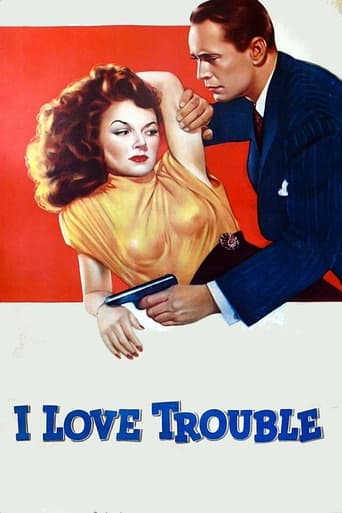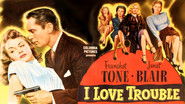dougdoepke
A detective is hired to investigate the real identity of client's wife, leading him into a tangled thicket of leads.So where is Janie Joy. Detective Bailey's having a heckuva time finding out, what with all those luscious ladies parading in and out—not that I'm complaining. But the sorting process does get difficult at times. This is a detective story, and not classic noir, more like Philo Vance than Phillip Marlowe. LA-area locations are emphasized rather than light and shadow. But it is a good look at post-war LA, including the photogenic Buster Buffin's Buffett.As the detective, the slender Tone brings a different kind of appeal. Wisely, the screenplay emphasizes his verbal skills rather than tough-guy brawn. In fact, he almost gets shoved around enough to embarrass fall-guy Elisha Cook Jr. Still, Tone does have a ready smile and easy charm. But that's also a problem for the movie. In short, characters and events lack the kind of grit needed to generate needed menace. Sure, there is a guessing game as to where Janie Joy is, but it's more like a brain-teaser than a fear factor. Plus, screenwriter Huggins clearly knows his way around wisecracks and clever banter. Yet the story's architecture remains murky and plodding. All in all, this is a movie of individual scenes rather than memorable whole.Nonetheless, it's a good chance to ogle the ladies and their 40's fashions, along with Detroit's four-wheel designs, post-war, that is.
expandafter
For one thing, I didn't find Franchot Tone convincing as a tough private investigator.As the film progressed, I didn't feel that I was gaining any insight into what was going on inside the characters heads. They remained ciphers.The plot, which is more confusing than engrossing, crawls along and never gains any momentum.I found the background music irritating and distracting. If a film is good, why does it need lush music to induce the right mood in the viewer?
filmnoirist
A new print of "I Love Trouble" was just screened last night (1/31/07) at Noir City 5, San Francisco's noted film noir festival. (http://noircity.com)In short, it was amazing. Roy Huggins was very heavily influenced by Dashiell Hammett, but let me tell you he could go toe to toe with the best Hammett had to offer. Every scene was filled with killer lines, right up to the last line of the film (Girl who wants to kiss the protagonist: "I didn't know there'd be a line." Girl who's kissing him: "Honey, this is the end of the line.") Franchot Tone is perfect as the suave but funny private dick who always has a wisecrack, thinks on his feet, and one heck of a set of...nerves.This is a must-see for any film noir aficionado. Alas, it's not yet on DVD and was never on VHS; if you see it coming on cable, Tivo it, tape it, miss work, skip your vacation, stand up your date, do what it takes as long as you DON'T MISS THIS GEM.JL
bmacv
Don't be put off by the frisky title: I Love Trouble isn't one of those dismal crime-cum-comedy hybrids so inexplicably popular in the '40s (true, a bantering element tries to creep in from time to time but it's held mercifully at bay; one routine, however, starring a hash-slinger named Miss Phipps, deserves to be bronzed).It's a pretty hard-boiled private-eye yarn, very much in the Raymond Chandler tradition - maybe a bit too much. More specifically, I Love Trouble follows the footsteps tramped out by Murder, My Sweet and The Lady in the Lake, and follows them doggedly. And its subsidiary roles are filled with actors who make up a Who's Who of film noir: Janice Carter, Adele Jergens, John Ireland, Raymond Burr (barely visible, alas), Tom Powers, Eduardo Ciannelli, Steven Geray, Sid Tomack. Parts even smaller (it's a big cast) are filled to the brim with apt characterization.The principal role of the gumshoe, however, goes to Franchot Tone, who plays it very much in the Powell-and-Mongomery-as-Marlowe style. He's hired by a tough businessman (Powers) to keep tabs on his elusive wife (Lynn Merrick). Tone traces the obligatory route from low dives to high places in his quest, from back alleys in Portland and fish dumps near the oil derricks of Santa Monica (Chandler's corrupt `Bay City') to gated mansions where swimming pools sparkle amid manicured lawns. All Tone knows is that, back in '46 (or was it '41?), Merrick came down from Oregon, where he learns that she was a bubble dancer in a mobbed-up nightclub, who absconded to Southern California with a cheesy comic (Tomack).Or did she? When another woman claiming to be Merrick's sister (Janet Blair) fails to recognize her picture, Tone finds himself with a lot of pieces none of which seem to fit together. And the heavies from up north are joined by powerful folks in Los Angeles who firmly discourage him from looking any further (when he's not being eyed fetchingly by expensive wives and mistresses, he's conked on the head or drugged up at every turn). Getting warmer, he tries to coax more information from Tomack, only to find the funny fishmonger dead and himself a suspect. But when Merrick's body washes up under a pier, her death opens more questions than it answers....The director, S. Sylvan Simon, shows considerable promise which was not to be redeemed (he died, at age 41, three years after making this movie). But most of the credit, however derivative, should probably accrue to its writer, and author of the novel on which it's based, Roy Huggins; he also penned Too Late For Tears, Woman in Hiding and Pushover, and, moving to television, would create 77 Sunset Strip, The Fugitive, and The Rockford Files. It goes to show how cracking the books at the school of Raymond Chandler can pay off in the future. So what if I Love Trouble is knockoff Chandler, a cocktail shaken up from two films made from his novels? Chandler neat is a potent shot - even watered down it holds its deep, smoky flavor.





